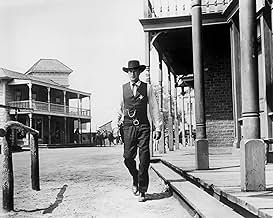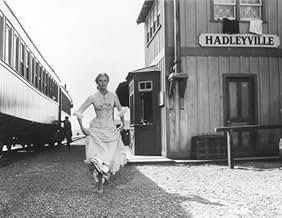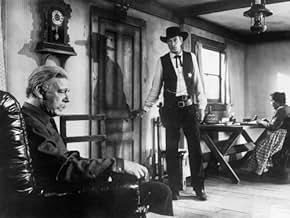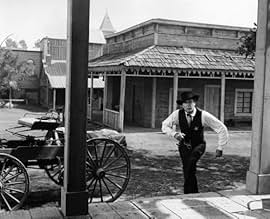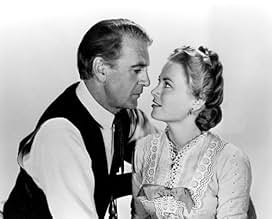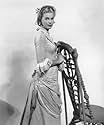Ein Town Marshal stellt sich gegen den Willen und ohne die Unterstützung seiner frisch angetrauten Ehefrau und der Bewohner der Stadt einer Bande von Banditen und Mördern und deren Anführer,... Alles lesenEin Town Marshal stellt sich gegen den Willen und ohne die Unterstützung seiner frisch angetrauten Ehefrau und der Bewohner der Stadt einer Bande von Banditen und Mördern und deren Anführer, den er vor Jahren ins Gefängnis gebracht hatte und der nun mit dem Zug um zwölf Uhr mitta... Alles lesenEin Town Marshal stellt sich gegen den Willen und ohne die Unterstützung seiner frisch angetrauten Ehefrau und der Bewohner der Stadt einer Bande von Banditen und Mördern und deren Anführer, den er vor Jahren ins Gefängnis gebracht hatte und der nun mit dem Zug um zwölf Uhr mittags in der Stadt eintreffen wird.
- Regie
- Drehbuch
- Hauptbesetzung
- 4 Oscars gewonnen
- 18 Gewinne & 12 Nominierungen insgesamt
- Martin Howe
- (as Lon Chaney)
- Sam Fuller
- (as Henry Morgan)
- Jim Pierce
- (as Robert Wilke)
- Townsman
- (Nicht genannt)
- Church Member
- (Nicht genannt)
Empfohlene Bewertungen
Ably supported by Grace Kelly as his pacifist Quaker wife, who discovers love and right triumphs over long-held preconceptions; Katy Jurado as Kane's former mistress, a fiery Latino type; and Lloyd Bridges as the feisty deputy; Cooper runs away with the acting honours. The theme tune by Tex Ritter is also worthy of note.
High Noon' works because of its tightly written script, its cracking pace and crackling tension. I've seen the film many times and always see something different to notice and admire; still, I'd love to see it again for the first time and not know the twists and turns, not know how it ends. A fabulous film one of the best.
Vengeance, treachery, ignorance, justice and survival - concentrated around the barrel of a gun.
Will Kane is the veteran lawman of Hadleyville, a small Kansas town that used to be the playground of bad men, notorious among them one Frank Miller. "This is just a dirty little village in the middle of nowhere," but Kane cleaned it up. Five years ago he had Frank Miller committed to a distant federal court on a murder charge. Today, as Kane weds his quaker bride, news arrives that Miller is free and heading for Hadleyville. His henchmen gather at the depot, and it becomes clear that Frank will arrive on the midday train, looking to settle scores with the marshall who arrested him. Should Kane leave town with his bride, thus avoiding trouble for himself and for Hadleyville? Or should he stay and face the Miller gang? Will the citizens rally round their marshall?
John Wayne famously criticised the film for being 'unAmerican', in that (in his view) a frontier community would not desert its lawman so abjectly. Implicit in Wayne's malediction is the notion that mainstream movies should promote wholesome patriotic values - a notion that led in Wayne's case to the debacle of "The Green Berets". Zinneman's acclaimed film probes the ugly side of human nature, "sifting out the hearts of men".
Zinneman and Director of Photography Floyd Crosby devoted a lot of care to the look of the film, effort that paid off handsomely. From our first view of Lee Van Cleef as an ominous shadow on the horizon to the climactic cuts which seem to accelerate the arrival of the fateful train, this is a movie which speaks through images. The arid, flat expanses of Kansas mirror the impassive sky, and the town's rickety structures seem puny against the bleak magnificence of nature. Human wishes are vain in the face of Fate. Rail tracks extend with cruel exactitude into the distance, converging in perspective upon the vanishing point, the symbolic spot whence Frank Miller will materialise. Lurking in the depot's shade, the dark presence which is the Miller Gang bristles with malice.
Zinneman is not afraid of extreme close-ups, which he uses to reinforce moments of emotional power (Kane realising that he has no support, Helen refusing to beg). He shoots Kane predominantly from below waist height, stressing his tall, erect stance as a symbol of moral authority. Compositions are tight and attractive throughout.
Gary Cooper was fifty-one years old and quite ill when "High Noon" was shot. He is, in truth, too old for the part. Gregory Peck had turned it down, and it is fascinating to imagine Peck as Kane. There is no rapport whatsoever between Cooper and Grace Kelly, and they make unconvincing newly-weds. "I won't be there when it's over," says the blushing bride, and though the script tries valiantly to give Amy a motivation (she became a quaker after seeing her menfolk gunned down), the abiding impression is of Kelly's prissy coldness.
"High Noon" is, for an action western, surprisingly strong on character. The judge (Otto Kruger) is clear-headed about running away from the Millers, and argues his position powerfully, yet his authority is punctured by his actions as he speaks - lowering the Old Glory, and concealing the scales of justice. Lloyd Bridges is excellent as Harvey, the deputy whose moral vision is clouded by lust for Helen and immature resentment of Kane. Katy Jurado never looked lovelier than here, playing the fallen woman Helen Ramirez who loved and lost Kane - and loves him still. A young Harry Morgan is Sam Fuller, the self-important coward who cannot face Kane. Marshall Howe (Lon Chaney Jr.) is the retired lawman who is now embittered and counsels Kane against throwing his life away for the sake of these undeserving citizens - "They just don't care!" In a cameo of pivotal importance that must have been great fun to play, Howland Chamberlain is the bitchy hotel desk clerk who hits Amy with a few home truths. James Millican is Herb, the dependable deputy who vacillates when the chips are down, and Jack Elam makes a fleeting appearance as the town drunk who sleeps through the entire drama.
One interesting plot development is the strange alliance which forms between Kane's two women. They meet in Helen's hotel room and decide to leave town together. Significantly, as they ride past Kane in the buggy, it is Helen who looks back, not Amy.
It has been suggested that "High Noon" obeys Aristotle's three unities, especially that of time, the depicted events being capable of fitting into the film's ninety-minute span. Clocks are everywhere in Hadleyville, and the passing of the minutes is constantly emphasised. My only observation is, it remains ten minutes to twelve for an unconscionably long time.
"The day cometh that shall burn like an oven," we are informed, and I for one found the film's climax rather disappointing after the intense build-up. "It's our problem because this is our town," declares a local worthy, but neither he nor anyone does anything about it. Zinneman's great crane shot, about halfway through the film, speaks more eloquently than the hollow words, zooming back to show a silent, friendless street, and one upright man, utterly alone.
On his wedding day, dependable lawman Will Kane (Gary Cooper) has just handed in his badge and is preparing to leave town with his bride Amy (Grace Kelly) when he receives devastating news. An old adversary, Frank Miller (Ian MacDonald), has been pardoned for crimes that he should have hanged for and is on his way to Kane's town of Hadleyville to get revenge. He is due on the noon train, leaving Kane one hour to either run for his life or make preparations to fight. Kane and Amy set off at full gallop, hoping to put some miles between themselves and danger, but Kane doesn't get far before he feels compelled to turn back. With the new sheriff not due for a day, he just can't let go of the extraordinary sense of duty and responsibility he feels towards his town. However when he gets back to town he gets quite a shock - for no-one has the guts (nor, in some instances, the inclination) to fight alongside him against the Miller gang. As time ticks unstoppably towards noon, Kane gradually realises that if he's going to stop Miller and his boys, he's going to have to do it alone!
Cooper's performance is extremely powerful and he received a thoroughly deserved Oscar for it. Kelly is good as his bride, although many viewers will find her character hard to like. Lloyd Bridges has a brilliant early role as Kane's deputy, while the very best of the supporting pack is Katy Jurado as a Latino woman whose "history" with most of the men in town puts her in an unenviable position when the shooting starts. Fred Zinnemann directs the film outstandingly, making each scene fit into the grander scheme of things with literate precision. Any aspiring young film-maker wanting to learn how to pace a film correctly should watch High Noon with a close eye, for it is unparallelled as the most perfectly paced film of all-time. The music by Dmitri Tomkin - plus that incredible ballad "Do Not Forsake Me Oh My Darling" by Tex Ritter - is just one more element that makes High Noon one of the great masterpieces. There's nothing else to say - if you haven't already, go out and see this film NOW!
Wusstest du schon
- WissenswertesIn 1951, after 25 years in show business, Gary Cooper's professional reputation was in decline, and he was dropped from the "Motion Picture Herald's" list of the top-ten box-office performers. In the following year, he made a big comeback, at the age of 51, with this film.
- PatzerIn a number of scenes there are Pabst Brewing signs seen on the inside and outside walls of the saloon. Although Pabst did brew in 1848, it did so under the name Best and Company and did not change to Pabst until 1889; the 37-star flag suggests the setting dates are between 1867-77.
- Zitate
Helen Ramírez: You're a good-looking boy: you've big, broad shoulders. But he's a man. And it takes more than big, broad shoulders to make a man.
- VerbindungenEdited into Darkness at High Noon: The Carl Foreman Documents (2002)
- SoundtracksHigh Noon (Do Not Forsake Me, Oh My Darlin')
Music by Dimitri Tiomkin
Lyrics by Ned Washington
Performed by Tex Ritter
[Played over the opening title card and credits; excerpts played throughout the movie]
Top-Auswahl
Details
- Erscheinungsdatum
- Herkunftsland
- Sprachen
- Auch bekannt als
- A la hora señalada
- Drehorte
- Produktionsfirma
- Weitere beteiligte Unternehmen bei IMDbPro anzeigen
Box Office
- Budget
- 730.000 $ (geschätzt)
- Weltweiter Bruttoertrag
- 217 $
- Laufzeit
- 1 Std. 25 Min.(85 min)
- Farbe
- Seitenverhältnis
- 1.37 : 1




